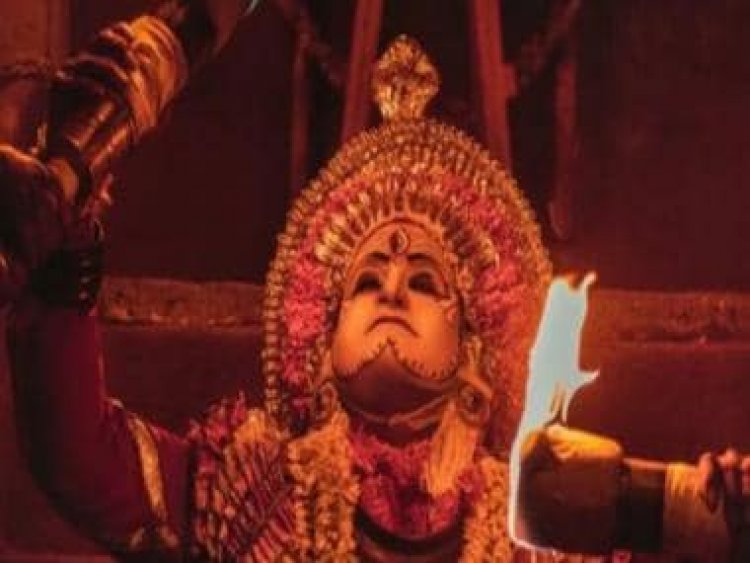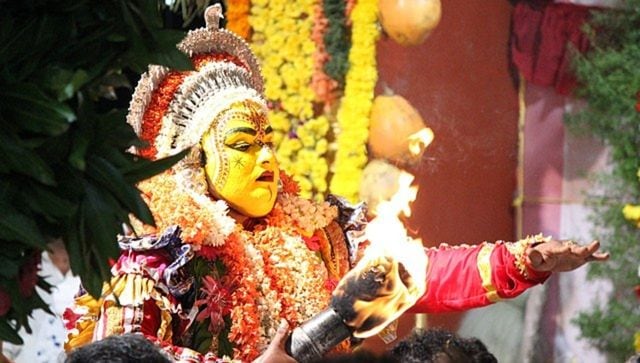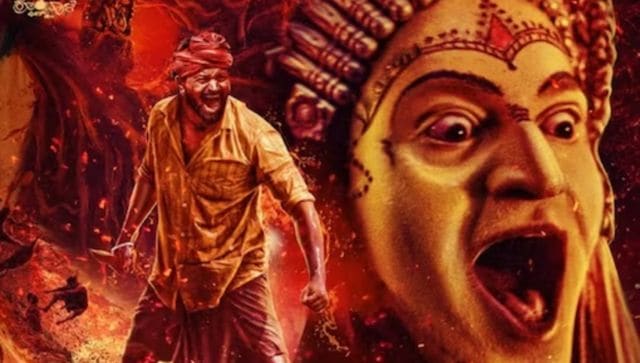Explained: The controversy around Bhoota Kola ritual depicted in Kantara
Explained: The controversy around Bhoota Kola ritual depicted in Kantara

Kannada film Kantara is being appreciated from all corners for its visual storytelling as well as compelling music and performances. The movie has been a box office success and has become the highest-rated Indian film on IMDB, an online movie database, with a rating of 9.3 out of 10.
However, Kantara (meaning mythical forest) has also garnered controversies along the way since its release on 30 September.
Actor and activist Chetan has courted controversy with his remarks on the cultural practice of Bhoota Kola depicted in the movie. Several complaints have been filed against him in Karnataka.
What is Bhoota Kola shown in Kantara and what is the controversy around it? What is the other row involving the blockbuster Kannada film? Let’s take a closer look.
What is Bhoota Kola?
Bhoota Kola is an annual folk ritual of Tulu-speaking people in Dakshina Kannada, Uttara Kannada and Udupi in Karnataka and some Kerala districts where local spirits or deities are worshipped.
As per Tulu Adivasi tradition, Bhoota Kola or Daiva Kola is a “non-vedic” ritual where Bhootas or Daivas (guardians and ancestors) are worshipped, reports The Quint.
“Idols representing ‘bhoothas’ are taken out in a procession to the beating of drums and bursting of firecrackers,” says the Karnataka Tourism website.

It is widely believed these spirits protect the village from unfortunate incidents, as per Deccan Herald.
A trained person performs this ritual who is believed to have ‘temporarily become a god himself’. “This performer is feared and respected in the community and is believed to give answers to people’s problems on behalf of the god,” the website adds.
The dancing and pooja ritual is accompanied by drums and music.
The performer carrying a sword and jingling bells imitates the ‘devil’ they represent, says the Karnataka Tourism website.
ALSO READ: Kantara: Decoding the shrieks of Daiva in Bhoota Kola and its many intonations
Kantara movie
Written and directed by Rishab Shetty, Kantara, the Kannada period action thriller, revolves around the relationship shared by forests and humans.
It has also been dubbed in Hindi, Tamil, Telugu and Malayalam and has become Hombale Films’ most-viewed film in Karnataka.
ಗಮ್ಮತ್ #Kantara Running Successfully.#DivineBlockbusterKantara@shetty_rishab @VKiragandur @hombalefilms @gowda_sapthami @HombaleGroup @AJANEESHB @actorkishore @AAFilmsIndia @GeethaArts @PrithvirajProd @DreamWarriorpic @APIfilms @PrimeMediaUS @KantaraFilm pic.twitter.com/rAiQuVFNRe
— Rishab Shetty (@shetty_rishab) October 25, 2022
According to Indian Express, Rishab who plays the lead character Shiva, a young rebel and a buffalo race champion, comes from a family that traditionally performs Bhoota Kola.
The movie also stars Sampthami Gowda, Kishore and Achyuth Kumar among others.
Bhoota Kola controversy
Filmmaker Rishab Shetty in an interview stated that Bhoota Kola was part of Hindu culture.
“It is part of Hindu culture and rituals. I am a Hindu and I believe in my religion and customs which nobody can question. What we have said is through the element that is present in Hindu dharma,” he was quoted as saying by Indian Express.
His statement came amid the criticism that Panjurli, a spirit worshiped in Bhoota Kola, has been depicted as Lord Vishnu’s incarnation, Varaha, in the film, reports The Quint.
Some cited the song Varaha Roopam in the movie which has Sanskrit lyrics to register their protest that Panjurli is shown as an incarnation of the Hindu God Vishnu.

Kannada actor and activist Chetan Ahimsa jumped into the debate, saying Bhoota Kola was not part of Hindu tradition. He also alleged Kantara has “appropriated” Bhoota Kola, which is a part of Tulu Adivasi culture, The Quint reported.
“Glad our Kannada film Kantara is making national waves. Director Rishab Shetty claims Bhoota Kola is ‘Hindu culture’. False. Our Pambada/Nalike/Parawa’s Bahujan traditions predate Vedic-Brahminical Hinduism. We ask that Moolnivasi cultures be shown w/ truth on & off screen,” he tweeted.
“Karnataka’s land has its own culture, tradition and history even before the Hindu religion began. Bhoota Kola and other practices are part of the Adivasi culture and have been existing for several thousand years,” he added.
Glad our Kannada film ‘Kantara’ is making national waves
Director Rishabh Shetty claims Bhootha Kola is ‘Hindu culture’
False
Our Pambada/Nalike/Parawa’s Bahujan traditions predate Vedic-Brahminical Hinduism
We ask that Moolnivasi cultures be shown w/ truth on & off screen
— Chetan Kumar Ahimsa / ಚೇತನ್ ಅಹಿಂಸಾ (@ChetanAhimsa) October 18, 2022
Rishab declined to respond to Chetan but said that he has been “very cautious” while making the film.
“When I was making this movie, those people who practised this culture were with me and I have been very cautious. I come from the same part and know about it. But still, I do not want to comment about it as only people who perform it have the right to speak,” he was quoted as saying by Indian Express.
Chetan bears the brunt
Chetan’s statements irked the Hindu-right wing who claim he has hurt “religious sentiments”.
Karnataka right-wing outfit Hindu Janajagruti Samiti has lodged a complaint against Chetan Ahimsa.
Shiva Kumar, Bajarang Dal convenor of Bengaluru North, also filed a complaint against the actor.
Karnataka minister for culture C Sunil Kumar also hit out at Chetan. “Daivaradhane is part of Hinduism. This is our culture and belong to our land. The government is focused on strengthening and supporting these practices. Those who are not aware of this culture must refrain from making claims,” the minister was quoted as saying by The Quint.
Dalit organisations support Chetan
Some activists from Dalit organisations came out in support of Chetan for his remarks.
Dalit leader and former mayor of Mysuru City Corporation Purushothama said Dalits and backward communities stand with Chetan, reports New Indian Express.
Kannada writer KS Bhagawan told The Quint that Hinduism is itself a “modern-day identity” that was popularised during British rule. He added that Bhoota Kola— the tribal practice of Tulunad– existed even before Hinduism.
Kantara’s other controversy
Kantara has landed in another controversy after Kerala-based music band Thaikkudam Bridge accused the makers of copyright infringement.
Thaikkudam Bridge has alleged Kantara’s Varaha Roopam song, composed by music director Ajaneesh Lokanath, is a rip-off of its 2017 track Navarasam.
The band has also threatened to initiate legal action against the makers of the film.
“We would like our listeners to know that Thaikkudam Bridge is in no way or form affiliated with Kantara. The unavoidable similarities between our IP ‘Navarasam’ and ‘Varaha Roopam’ in terms of audio is therefore a blatant infringement of copyright laws. From our standpoint the line between ‘Inspired’ and ‘Plagiarized’ is distinct and indisputable and therefore we will be seeking legal action against the creative team responsible for this,” the band wrote on Instagram.
The makers of the Kannada film are yet to respond to the controversy.
With inputs from agencies
Read all the Latest News, Trending News, Cricket News, Bollywood News,
India News and Entertainment News here. Follow us on Facebook, Twitter and Instagram.
What's Your Reaction?



























































